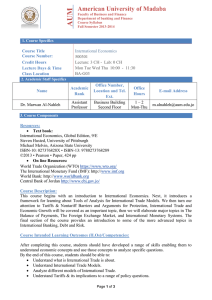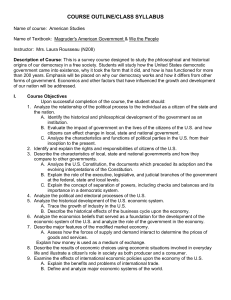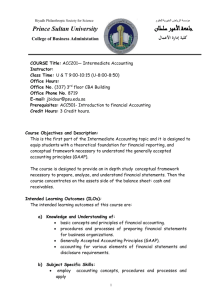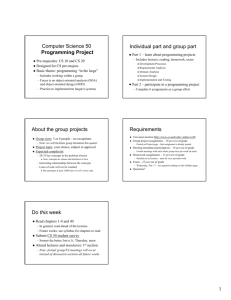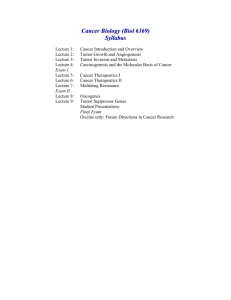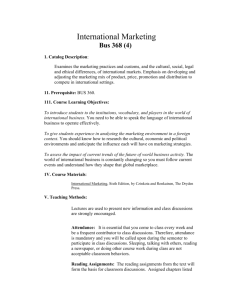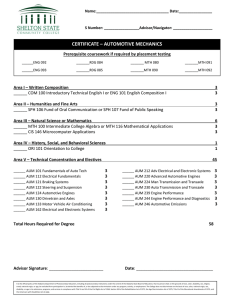AUM American University of Madaba
advertisement
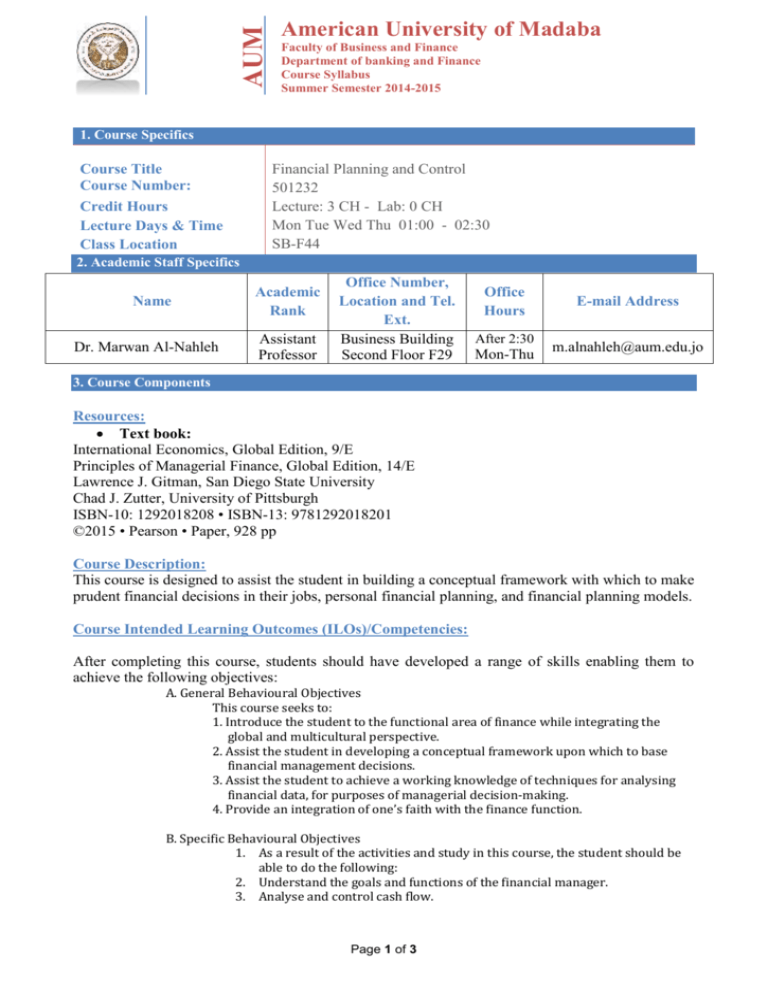
AUM American University of Madaba Faculty of Business and Finance Department of banking and Finance Course Syllabus Summer Semester 2014-2015 1. Course Specifics Course Title Course Number: Credit Hours Lecture Days & Time Class Location Financial Planning and Control 501232 Lecture: 3 CH - Lab: 0 CH Mon Tue Wed Thu 01:00 - 02:30 SB-F44 2. Academic Staff Specifics Name Dr. Marwan Al-Nahleh Academic Rank Assistant Professor Office Number, Location and Tel. Ext. Business Building Second Floor F29 Office Hours After 2:30 Mon-Thu E-mail Address m.alnahleh@aum.edu.jo 3. Course Components Resources: Text book: International Economics, Global Edition, 9/E Principles of Managerial Finance, Global Edition, 14/E Lawrence J. Gitman, San Diego State University Chad J. Zutter, University of Pittsburgh ISBN-10: 1292018208 • ISBN-13: 9781292018201 ©2015 • Pearson • Paper, 928 pp Course Description: This course is designed to assist the student in building a conceptual framework with which to make prudent financial decisions in their jobs, personal financial planning, and financial planning models. Course Intended Learning Outcomes (ILOs)/Competencies: After completing this course, students should have developed a range of skills enabling them to achieve the following objectives: A. General Behavioural Objectives This course seeks to: 1. Introduce the student to the functional area of finance while integrating the global and multicultural perspective. 2. Assist the student in developing a conceptual framework upon which to base financial management decisions. 3. Assist the student to achieve a working knowledge of techniques for analysing financial data, for purposes of managerial decision-making. 4. Provide an integration of one’s faith with the finance function. B. Specific Behavioural Objectives 1. As a result of the activities and study in this course, the student should be able to do the following: 2. Understand the goals and functions of the financial manager. 3. Analyse and control cash flow. Page 1 of 3 AUM American University of Madaba Faculty of Business and Finance Department of banking and Finance Course Syllabus Summer Semester 2014-2015 4. Utilize the basic tools of finance (e.g. horizontal analysis, vertical analysis, ratio analysis, and sources and uses of funds analysis) in analyzing a company to provide solutions for identified problems. 5. Implement capital budgeting techniques in making capital expenditure decisions. 6. Utilize the concept of cost of capital in making investment decisions. 7. Analyse sources available for personal and business organization financing. Teaching Methods: The structure of this course is elaborated throughout lectures, classroom debates, assignments, exercises, homework and projects. Assessment Instruments Mark 30% 20% 10% Midterm Exam Project Quizzes, Homework, Assignment and Participation Final Exam Total Course Academic Calendar 40% 100% Basic and support material to be covered Weeks Week 1: Week 2: Week 3: Week 4: Week 5: Week 6 Week 6 Week 7 Introduction to Financial Planning & Control Week 8 International Managerial Finance Week 9: Final Exam Homework/report s and their due dates Financial Statements and Ratio Analysis Cash Flow & Financial Planning The Cost of Capital Midterm Exam Capital Budgeting Techniques Leverage & Capital Structure Payout Policy Course Policies University regulations are applied to this course, regarding class attendance; punctuality, exams, late submissions; absence with permission; penalties for cheating; and policies for assignments and projects – if any. Students should be aware of all these regulations in addition to other regulations stated and described in the student’s handbook. General Policies for the Course: students must comply with: A) Lecture Management 1- Students should behave appropriately during lectures, in order to reflect the good reputation of the university. Page 2 of 3 AUM American University of Madaba Faculty of Business and Finance Department of banking and Finance Course Syllabus Summer Semester 2014-2015 2- Students should grasp the course objectives from the first day of attendance in order to work on achieving these objectives through the course duration. 3- Faculty members encourage students constantly to get involved in class discussions. Therefore, students should make use of these discussions in order to enhance their educational experience. 4- Students should not leave classrooms during lectures except for compelling reasons. B) Scientific Honesty The university prohibits students from any actions inconsistent with scientific honesty, including cheating in exams whether by giving or receiving information, or submitting assignments done by others. In case of breach of this sort, the student will be subject to an effective university punishment, which he/she should be well aware of. C) Late Attendance or Absence for Lectures 1- Students attending a lecture more than 10 minutes late will be marked as "late attendant", and every four late attendances will be count for one day absence. 2- Students attending the lecture more than 20 minutes late will be allowed to enter the classroom but will be marked as "absent". 3- If absences exceed 15% of the lectures, then the student will be disqualified from the course, and will get the university zero mark for the course. D) Absence from exams 1- Absentees from a short test (quiz) will not be allowed for a make-up test. 2- Official excuses for missing any exam must be provided to the lecturer for the appropriate actions to be taken. 3- Special forms designed for absence from final exams are available at the Admission and Registration Department. The Dean of the related course must be provided with these forms by the student within seven days from the date of the missed exam in order to take the appropriate action. 4- Medical excuses must be signed officially and stamped by the Medical Centre. 5- All make up exams will be given only once during the same semester. 6- Make up for the final exam must be held during the first two weeks of the following semester. 7- No excuse will be accepted in case of failing to attend the makeup exam. There will be no other chance for another make up exam. E) Additional Instructions 1- Cell phones must be turned off during lectures and exams. 2- Students should refer to additional references and do extra reading for the course. 3- Students should submit their assignments within the due time. 4- In case of absence or late registration for the course, the student is fully responsible for the follow up of the missed lecture. 5- Students are advised to keep copies of their assignments as a reference and record. 6- Objection on final exam result is limited to the specific procedures developed by the university. Students have to refer to the Department of Admission and Registration to view relevant details. Page 3 of 3
